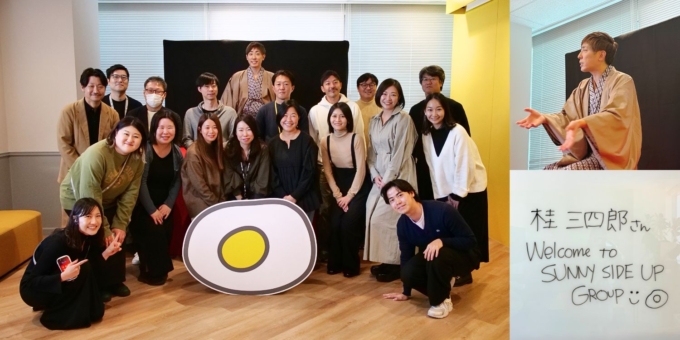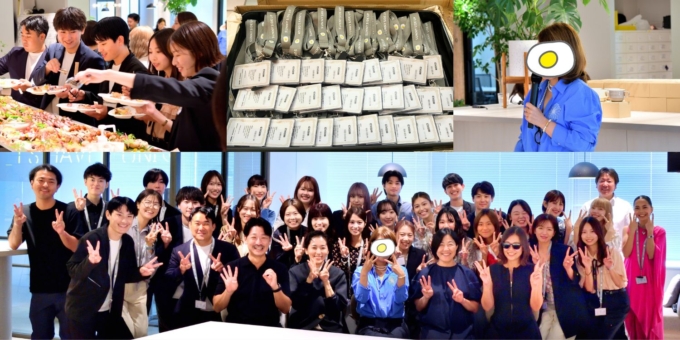The Valentine’s Day situation for the working Generation Z! How is Valentine’s Day diversifying, and what is it actually like?
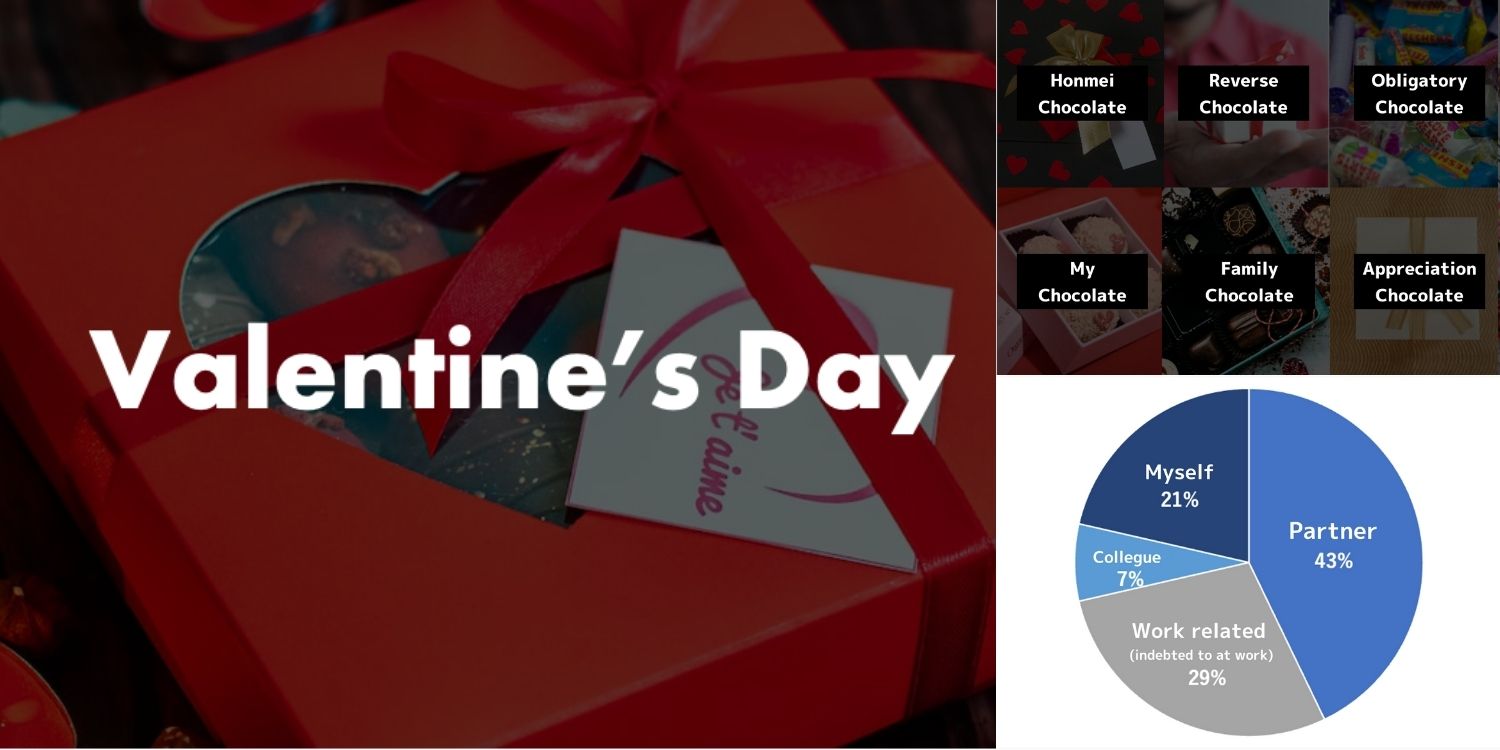
Hello! I am Ninomiya from the Account Planning Department.
It’s already February! Time flies, doesn’t it? It feels like New Year’s was just yesterday…
Now, February means we have “Setsubun,” but of course, the classic event is Valentine’s Day, right?
(I know this was a bit forced, but I’d appreciate it if you could go easy on me 🌱)

Until now, February 14th has been celebrated around the world as “Lovers’ Day,” a day for couples to confirm their love for each other…
Not only the traditional “Honmei Chocolate,”* but also the various ways of giving chocolates on Valentine’s Day are changing.
*Honmei Chocolate: Chocolate Gift of true love.
| ・Reverse Chocolate |Chocolate given by a man to a woman as a confession of love The recipients include girlfriends, wives, and women of interest ・Obligatory Chocolate|Chocolate given by women to men other than their favorite The recipients include friends, boss, and co-workers General term for chocolate given to one with regular interactions ・Friend Chocolate |Chocolate exchanged particularly among female friends Exchanging chocolates tailored to each other’s preferences such as cute or trendy wrapped chocolates ・My Chocolate |Valentine’s chocolates that one gives to oneself Also known as “self-chocolates” Buying slightly luxurious chocolates as a reward of hard work ・Family Chocolate |Chocolates gifted to family members or enjoyed together as a treat Growing trend of enjoying time with family with a touch of luxury. ・Appreciation Chocolate|Chocolate gifted to people to show gratitude Type of Obligatory Chocolate but with more sincere appreciation Gifted mainly to boss, teachers, and elders |
In recent trends, there has been the emergence of what’s called “Oshi Choco,(Fave Chocolate),” where people give chocolates to their favorite individuals!
※Fave Chocolate |Chocolates purchased with the intention of giving them to one’s fave
In Japanese, “Oshi” is a slang for faveorite
Chocolates designed after one’s favorite person or “推し” (oshi)
Posting on social media to show love for the favorite person
Exchanging them with fellow fans of the same favorite person
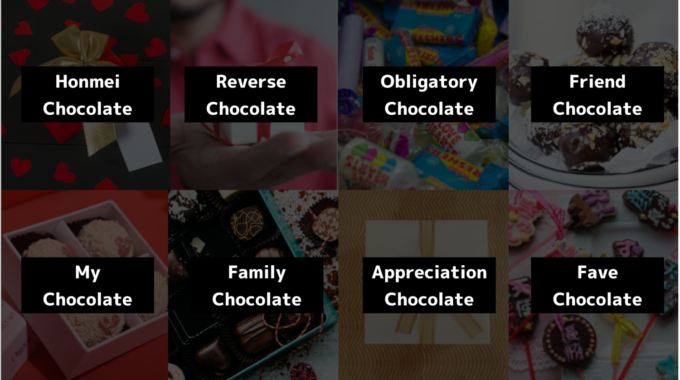
As such, values and approaches to Valentine’s Day have evolved and become even more flexible than before.What does the “working Generation Z” actually feel about this?
I, along with other working Generation Z individuals around me, decided to conduct a survey to understand the actual situation!
*Please note that this survey was conducted among different occupations and life stages of working Generation Z individuals (aged 23-26). These results may not represent everyone’s perspective, so please take them as reference.
How does the working Generation Z spend Valentine’s Day?
Q. Do Generation Z workers plan to give chocolates to someone this Valentine’s Day?
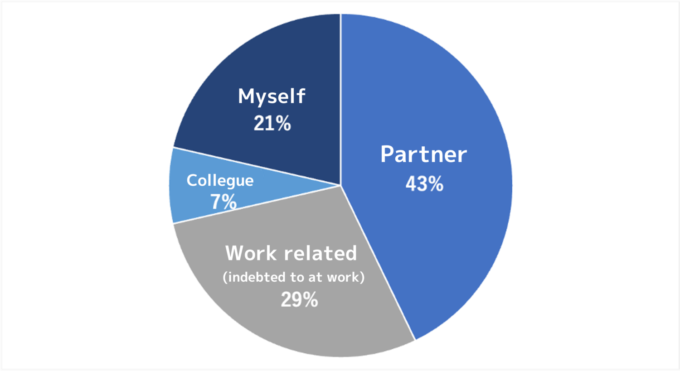
Among the people surveyed, there were no individuals who did not give or purchase chocolates, and generally, it seems that many people tend to give chocolates to their partners or those they are indebted to at work.
※Note: “Partners” include lovers and spouses.
In general, there are mainstream practices like “Family Chocolates” and “Friend Chocolates.” However, considering that the surveyed individuals are working adults and this year’s Valentine’s Day falls on a weekday, and since they may not live alone or have special plans to meet friends, it’s possible that working adults have fewer opportunities to give chocolates.
Actually, when I was a student, I used to make or buy chocolates to give to friends and club members. However, since becoming a working adult, I’ve started giving chocolates to a more limited number of people.
Moreover, I ended up giving the leftover chocolates to my family (oops!).
Also, this is just a personal observation, but while for similar events like Christmas, spending it alone can feel lonely and people tend to gather with friends, but for Valentine’s Day, the tradition of giving chocolates seems to outweigh the tradition of spending it with someone. So, there may be fewer people who are concerned about being alone on Valentine’s Day.
(Christmas is more about trying to find a partner before the event, while Valentine’s Day has always been more about creating romantic relationships.)
In addition, while there is demand for chocolates as a reward for oneself, such as “My Chocolate,” for those with partners, the perspective is not just about personal treats but also about sharing the chocolates. It’s more like “giving chocolates to your partner = treating yourself,” so they choose chocolates to give with this perspective in mind.
Does Valentine’s Day change depending on the recipient?
What are the differences in the types of gifts and the way feelings are perceived for the most common recipients, “partner” and “colleagues (those who are indebted to at work)”?
For Partners>>
As for the gifts, there were many store-bought chocolates, homemade chocolates, and cakes.
For partners who don’t like sweets, some choose to give non-chocolate items. Depending on the relationship with the recipient, some pairs opted to present a homemade Valentine’s dinner as a gift.
It seems that people are trying to break away from the concept of “Valentine’s equals chocolate” and are putting effort into being creative and avoiding giving something similar to what they gave before, based on the recipient’s preferences.
Moreover, regarding the perception of Valentine’s Day and why they give gifts, many view it as an opportunity to express gratitude and to savor the event’s sense of occasion and specialness. Despite the diversification of Valentine’s Day, the perception of it as a “slightly special day” may not have changed.
Work Related(those who are indebted to at work)>>
On the other hand, when it comes to giving gifts to colleagues or those you are indebted to at work, it seems unanimous that store-bought chocolates or sweets are the preferred choice.
Homemade gifts may be perceived as too heavy or may not be well-received by everyone, especially if the giver’s baking skills are not widely known.
Additionally, the reasons behind giving to these individuals vary. While there is a sense of gratitude for the help received, in some workplaces, giving Valentine’s chocolates has become an unspoken rule or tradition, creating a custom of giving chocolates as an implicit understanding.
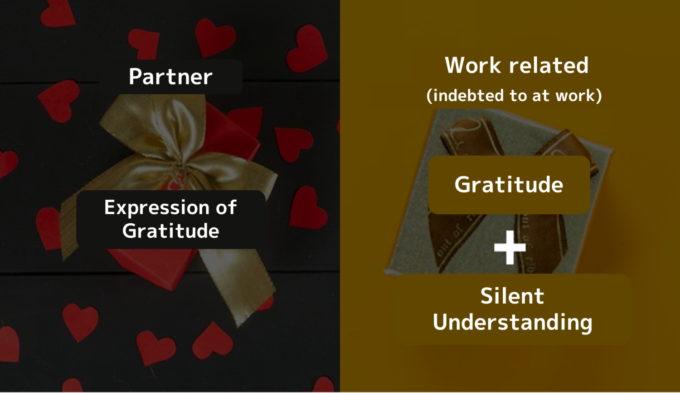
It seems that while there is a sentiment of expressing gratitude to those whom Valentine’s chocolates are given, in the workplace, it’s perceived more as an obligatory event.
Regarding these recent Valentine’s trends, what are the actual thoughts of the working Generation Z?
To be honest, what do you think about Valentine’s Day?
Here are some opinions
・Once I became a working adult, Valentine’s Day felt obligatory and it became unpleasant.
・It’s an event where you have to be considerate because what you give varies depending on the person.
・It was fun exchanging chocolates with classmates or club friends during middle and high school, but as an adult, it doesn’t feel like such an important event anymore.
・It has become formalized, so I don’t genuinely enjoy it. To be honest, I think Valentine’s Day could disappear and it wouldn’t bother me.
above. However, on the other hand, there are also people who discover their own enjoyable ways to celebrate Valentine’s Day!
Since starting work, there have been negative voices about Valentine’s Day as mentioned above. However, on the other hand, there are also people who discover their own enjoyable ways to celebrate Valentine’s Day!
・In high school, it was more of a ritualistic exchange where you’d just make something and trade it, but in college, it feels more like treating yourself, going out to eat chocolate or buying it.
・As I transitioned from being a student to a working adult, I started to buy store-bought chocolates for myself and enjoy them.
・It feels like there’s less of a public event aspect compared to when I was a student. Now, I only give chocolates to a select few. With more financial independence, it’s become an event for myself to do as I please.
・I’m allowed to buy a slightly nicer chocolate. It’s like a bonus time for eating.
As people transition into adulthood and start working, some may have less favorable impressions of Valentine’s Day compared to the enjoyable “Friend Chocolates” of their student days, and instead, they may feel obligated to give “Obligatory Chocolates” to colleagues. However, as they earn more money and develop a stronger desire to reward themselves for their hard work, the trend of giving “My Chocolates” or “Reward Chocolates” has emerged.
It seems that working life becomes a turning point where the perception of Valentine’s Day changes.
Summary of Valentine’s Day Situation for Working Generation Z
As a result of the survey, the Valentine’s Day situation for the working Generation Z differs in values between teenagers and those in their 20s, with “working” becoming a turning point in how Valentine’s Day is perceived.
Especially as people enter the working adults Valentine’s Day has shifted towards:
・Expressing “gratitude” towards the recipients of gifts
・Viewing it as a special day to pamper oneself
Thus, the original significance of Valentine’s Day is less commonly observed.
Some people enjoy Valentine’s Day as an event or a special treat, while others perceive it as an obligation, and for some, it’s simply seen as a hassle.
So, how should we approach users with these insights?
A notable example is when a certain chocolate brand ran newspaper ads around 2018 with the message, “Let’s stop obligatory chocolates in Japan.”
This campaign could be seen as a declaration of liberation from Obligatory Chocolates.
It aimed to encourage users who actually buy chocolates to genuinely enjoy Valentine’s Day.
Valentine’s Day has become diverse, so it’s important to understand what users feel. We can either speak up for voices that haven’t been heard before or suggest new ideas. Instead of sticking to old traditions, let’s offer ways to enjoy the day that cater to different preferences.
“Insights into the Working Generation Z,” lets you explore how Generation Z truly feels and what effective approaches are. We aim to provide insights and solutions to concerns about Generation Z, offering help and guidance.
Although it’s irregular, we hope this serves as a helpful hint.








